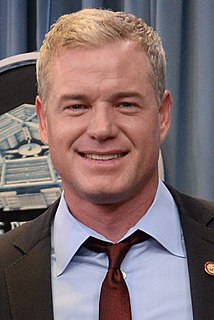A Quote by Neale Donald Walsch
Life may more than once call upon you to prove Who You Are by demonstrating an aspect of Who You Are Not.
Related Quotes
I also remember the moment my life changed, the moment I finally said, "I've had it!" I know I'm much more than I'm demonstrating mentally, emotionally, and physically in my life. I made a decision in that moment which was to alter my life forever. I decided to change virtually every aspect of my life. I decided I would never again settle for less that I can be.
I actually think, when you're young, ambitions are somewhat common - you want to prove yourself. It may grow out of different life experiences. You may want to prove that you are worthy of the admiration of the demanding father. You may want to prove that you are worthy of the love of an absent father.
There is a long list of psychology research demonstrating that appearances matter more than most us would care to admit. As shallow as it may be, better-looking people have been shown in various studies to have higher self-esteem and more charisma, are considered more trustworthy and are better negotiators.
I do not pretend to be able to prove that there is no God. I equally cannot prove that Satan is a fiction. The Christian god may exist; so may the gods of Olympus, or of ancient Egypt, or of Babylon. But no one of these hypotheses is more probable than any other: they lie outside the region of even probable knowledge, and therefore there is no reason to consider any of them.
I think that, every individual you invent in narrative work, you have to have some root in who that person is. That may be an aspect of yourself; it may be an aspect of something that you like, that you don't like. It may be an aspect that you wish you had. Maybe something you admire in another person.
There is a period in one's life - perhaps not longer than six months - when one lives in two worlds at once ... It is the time when one has freshly learned to read. The Word, till then a denominating aspect of the Thing, has suddenly become detached from it and is perceived as a glittering entity, transparent and unseizable as a jellyfish, yet able to create an independent world that is both more recondite and more instantaneously convincing than the world one knew before.
I've been training like crazy with my trainer Decker Davis all the time, and we've been doing this new thing called Danger Train. It's kind of storytelling about the offseason training, there's a lot more to come with that. More than anything, from a nutrition aspect to the speed aspect to the strengthening aspect and, most importantly, to the mental aspect, we're always trying to grow exponentially. We're continuing to find new ways to do that.
To edit someone from your life must be a properly evaluated decision. After all, the act of distancing yourself is difficult and, if executed improperly, could prove even more troublesome than if you were to have done nothing at all. The key is to create the distance gradually - a 'fade out' as I like to call it.
We bless the life around us far more than we realize. Many simple, ordinary things that we do can affect those around us in profound ways: the unexpected phone call, the brief touch, the willingness to listen generously, the warm smile or wink of recognition. All it may take to restore someone's trust in life may be returning a lost earring or a dropped glove.



































